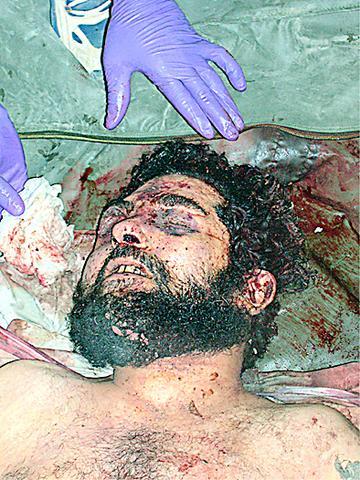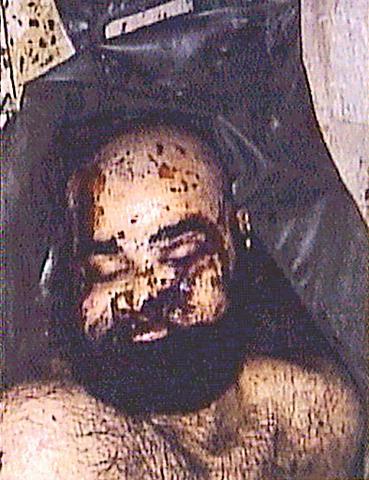The US military released grisly photographs of the bodies of former Iraqi president Saddam Hussein's sons yesterday to try to convince Iraqis the feared brothers were dead and staunch a wave of deadly guerrilla attacks.
Officers in Baghdad released two mortuary pictures showing the head and torso of Uday and two of Qusay, along with comparative pictures of the brothers when they were alive and X-ray slides apparently used to help identify Uday.
The pictures showed the bodies of the two men lying face up on plastic sheeting. Both had thick beards. Uday's face was splattered with blood from a wound to his nose and upper lip.

PHOTO: AP
Military officers said Uday appeared to have been killed by a bullet in the head, but it was not yet known whether he had been shot by US soldiers or had committed suicide.
A spokesman for the US-led civil authority in Iraq said journalists would be allowed to film the bodies for themselves today to dispel any doubts the photographs were authentic.
Dental records and X-rays also would be made available.

PHOTO: REUTERS
Washington hopes the killing of Uday and Qusay in an attack on their hideout in the northern city of Mosul on Tuesday will tighten the noose around Saddam himself and demoralize guerrillas who have mounted daily attacks on American troops.
But three soldiers were killed south of Mosul early yesterday when their convoy was shot at with AK-47 assault rifles and rocket-propelled grenades, in the second deadly attack on the 101st Airborne Division since 200 of its troops stormed the villa in Mosul where Uday and Qusay were hiding.
There was no evidence it was a revenge attack, a US army spokesman said, though he did not rule out that motive.
On Wednesday, one soldier from the division was killed and seven were wounded when two vehicles hit a mine on the outskirts of the city, and in a separate ambush, a soldier from the 3rd Armored Cavalry Regiment was killed west of Baghdad.
Five US soldiers have now been killed since the deaths of Uday, 39, and Qusay, 37, Saddam's heir apparent.
The US army's decision to release the photographs is a controversial one -- the military was outraged when Arab television channels broadcast pictures of dead and captured American soldiers during the war that toppled Saddam.
Many Iraqis had said they would not believe Uday and Qusay were really dead unless they saw proof.
Most Iraqi newspapers do not publish on Fridays, the Muslim holy day, but Ismail Zaiyer, editor-in-chief of Al Sabah, a Baghdad newspaper backed by the US-led administration, said he would run a special edition today to show the photographs.
The brothers were tracked down after a tip-off from an Iraqi informant expected to get the two US$15 million rewards offered for information leading to their death or capture. Their father has a US$25 million price on his head.
They were holed up in a Mosul villa with a bodyguard and Qusay's teenage son, US officials say. Armed only with AK-47 assault rifles, they wounded four American soldiers and held out for hours against a devastating array of US firepower, including attack helicopters, heavy machineguns and grenades.
Also see stories:

CHAMPIONS: President Lai congratulated the players’ outstanding performance, cheering them for marking a new milestone in the nation’s baseball history Taiwan on Sunday won their first Little League Baseball World Series (LLBWS) title in 29 years, as Taipei’s Dong Yuan Elementary School defeated a team from Las Vegas 7-0 in the championship game in South Williamsport, Pennsylvania. It was Taiwan’s first championship in the annual tournament since 1996, ending a nearly three-decade drought. “It has been a very long time ... and we finally made it,” Taiwan manager Lai Min-nan (賴敏男) said after the game. Lai said he last managed a Dong Yuan team in at the South Williamsport in 2015, when they were eliminated after four games. “There is

Chinese Nationalist Party (KMT) lawmakers have declared they survived recall votes to remove them from office today, although official results are still pending as the vote counting continues. Although final tallies from the Central Election Commission (CEC) are still pending, preliminary results indicate that the recall campaigns against all seven KMT lawmakers have fallen short. As of 6:10 pm, Taichung Legislators Yen Kuan-heng (顏寬恒) and Yang Chiung-ying (楊瓊瓔), Hsinchu County Legislator Lin Szu-ming (林思銘), Nantou County Legislator Ma Wen-chun (馬文君) and New Taipei City Legislator Lo Ming-tsai (羅明才) had all announced they

Nvidia Corp CEO Jensen Huang (黃仁勳) yesterday visited Taiwan Semiconductor Manufacturing Co (TSMC, 台積電), as the chipmaker prepares for volume production of Nvidia’s next-generation artificial intelligence (AI) chips. It was Huang’s third trip to Taiwan this year, indicating that Nvidia’s supply chain is deeply connected to Taiwan. Its partners also include packager Siliconware Precision Industries Co (矽品精密) and server makers Hon Hai Precision Industry Co (鴻海精密) and Quanta Computer Inc (廣達). “My main purpose is to visit TSMC,” Huang said yesterday. “As you know, we have next-generation architecture called Rubin. Rubin is very advanced. We have now taped out six brand new

POWER PLANT POLL: The TPP said the number of ‘yes’ votes showed that the energy policy should be corrected, and the KMT said the result was a win for the people’s voice The government does not rule out advanced nuclear energy generation if it meets the government’s three prerequisites, President William Lai (賴清德) said last night after the number of votes in favor of restarting a nuclear power plant outnumbered the “no” votes in a referendum yesterday. The referendum failed to pass, despite getting more “yes” votes, as the Referendum Act (公民投票法) states that the vote would only pass if the votes in favor account for more than one-fourth of the total number of eligible voters and outnumber the opposing votes. Yesterday’s referendum question was: “Do you agree that the Ma-anshan Nuclear Power Plant